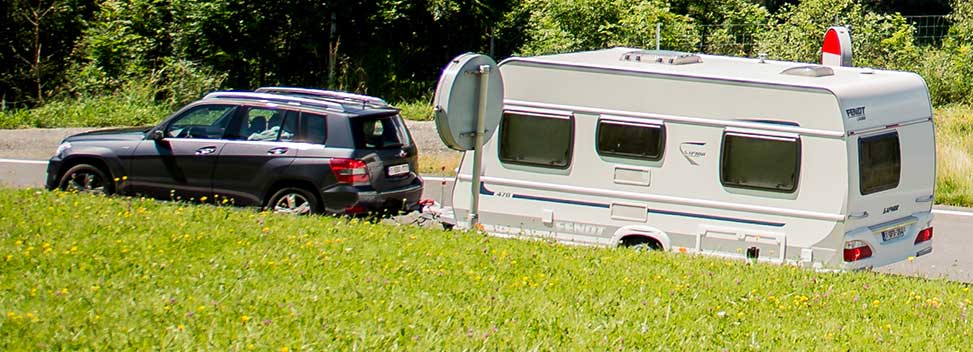A guide to towing your caravan
Written by Nick Grant
5 Aug 2022
7 min read

Are you planning a UK seaside trip or a short city break? If you’re taking a caravan in tow, preparation could be critical. Towing a caravan requires more thought than just driving a car. There are different rules for speeds, lane access, safety checks, and even restrictions on the weight and width. Plus, you might want to consider caravan insurance to cover you during the drive and your holiday.
To ensure your trip runs smoothly, we’ll take you through the need-to-know information for towing caravans – from pre-trip checks to insurance policies.
What can you tow?
Towing a caravan requires a full driving licence (category B), which you receive after passing your driving test. However, there are restrictions on the weight of the caravan you can tow. It all depends on when you received your driving licence2. Weight guidelines are provided as maximised authorised mass (MAM) measurements, considering the combined weight of a vehicle and a caravan. So, you’ll need to ensure the total MAM of your car and caravan doesn’t exceed the limits when loaded, rather than just the caravan’s weight2. Driving licences issued before 1 January 1997 If you received your licence before January 1997, the combined MAM weight allowance is up to 8,250kg. Driving licences issued after 1 January 1997 The government introduced changes in Autumn 2021 that removed the need for additional tests to tow trailers up to 3,500kg2. Now, all new licences contain a BE code, so you’re automatically entitled to drive a caravan or trailer with a MAM of up to 3,500kg2. For anything heavier, you’ll need to take a new test to get a category C1 licence. This will allow you to drive caravans with a total MAM of up to 7,500kg3.Understanding UK towing and trailer regulations
The government has specific requirements for towing a caravan. Alongside the MAM, you’ll need to comply with width, length, towing bars, and lighting regulations. Here’s what you need to know.Caravan width
The maximum width for all towed caravans is 2.55 metres4.Caravan length
The maximum length for all towed caravans is 7 metres, excluding the A-frame (the triangular section where the hitch is attached)4.Towing bars
Any tow bars used must be EU-approved or ‘type approved’. So, they should have a label including an approval number and the vehicle types it’s approved for5.Towing mirrors
Towing mirrors give you sufficient rear view while driving. Failure to use these may result in a fine of up to £1,000, plus three points on your licence 5. A quick visual check might be enough to determine whether you need towing mirrors. But if you’re unsure, check whether the caravan is wider than the width of your car. If it is, use towing mirrors.Number plates
You should fit your caravan with a licence plate on the rear that matches your vehicle's licence plate5.Caravan lights
Your caravan must have lights in 6:- Two rear red sidelights
- Two red stop lights
- Two amber indicator lights
- Two triangular red reflector lights
- An illuminated number plate
Speed limits
You must stick to the following speed limits when towing a caravan 7:- 30 mph (48 km/h) in built-up areas
- 50 mph (80 km/h) on a single carriageway
- 60 mph (96 km/h) on a dual carriageway
- 60 mph (99 km/h) on a motorway (three or four lanes)
Lane access
It’s illegal to use the right-hand lane on a motorway when towing a caravan, including three and four-lane motorways 8.Preparing your car to tow a caravan
Getting ready for your trip means more than packing a suitcase. The government recommends running some checks to ensure your vehicle and caravan are safe and legal 8. First, check the maximum weight your car can safely tow and calculate the MAM. Check the vehicle’s handbook or manufacturer’s plate to find this information. It is also recommended that you:- Weigh your caravan to ensure it’s within limits — you could take it to a weigh bridge.
- Check your tyres are correctly inflated and have at least 1.6mm of tread6.
- Ensure you have the right towing equipment and that it’s fastened correctly, especially the breakaway cable.
- Ensure all lights and indicators work correctly.
- Check your brakes are working correctly.
Safety tips for towing a caravan
You should always take extra caution while towing a caravan on the road. In particular, you should consider the following:- Make sure all heavy items are loaded on the axle.
- Ensure all loads are fastened down securely.
- Make certain all doors, latches, and cables are secure.
- Never allow passengers in the caravan while you’re towing it.
- Drive with extra caution, adhering to speed and lane access requirements.
Do you need insurance to tow a caravan?
Insurance is needed to drive on the road with or without a caravan. Some car insurance policies cover towing a caravan, but it’s always worth checking with your provider. However, even if you’re covered, it might only protect against third-party damage, potentially leaving you liable if something goes wrong. That’s why it’s a good idea to consider purchasing Touring caravan insurance to help protect against extra risks. At Intasure, we’ll help you find caravan insurance to help keep you and your valuables safe. Our policies can cover theft, damage, personal accident, loss of use, and we can also provide cover for EU travel. Get a quote online in minutes or speak with our team today on 0345 111 0680 Sources- https://www.gov.uk/towing-rules
- https://www.gov.uk/guidance/new-rules-for-towing-a-trailer-or-caravan-with-a-car-from-autumn-2021
- https://www.gov.uk/driving-licence-categories
- https://www.gov.uk/towing-with-car/weight-and-width-limits
- https://www.gov.uk/towing-with-car/trailer-and-towing-equipment
- https://www.ntta.co.uk/law/trailers/lights
- https://www.gov.uk/speed-limits
- https://www.gov.uk/guidance/tow-a-trailer-with-a-car-safety-checks